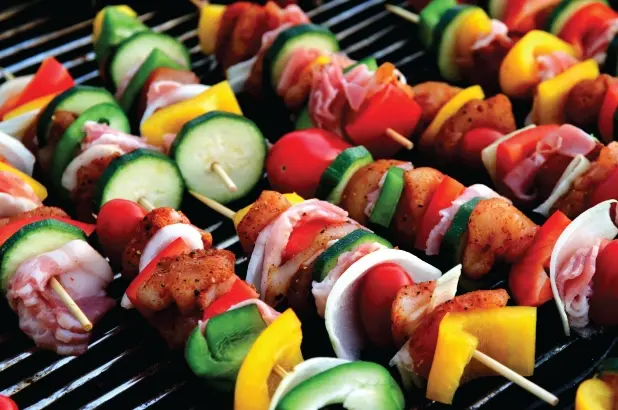How Your Grill Can Help Your Diet
Summer is a great time to break out the barbecue grill and lighten up your diet! Grilling season doesn’t have to only mean hamburgers, bratwurst, and steaks. There are many great choices for the grill that will keep you in great shape for all those fun summer activities. Rather than fatty hunks of meat or sausages, try grilling:

— Chicken breast
— Turkey breast or tenderloin
— Ground turkey, chicken or lean hamburger (add great seasonings)
— Veggie/grain/soy burgers
— Vegetables
— Turkey hot dogs or sausages/brats
— Light smoked sausage or turkey polska kielbasa
— Fish (salmon, swordfish, shrimp, catfish, trout, red snapper, tuna, etc)
— Or, if you choose beef, select a high-quality but small portion
Marinades are easy to make and allow you to use some creativity in your cooking! If you’re making your own marinade, plan on about a half cup per pound of meat. There are usually 3-4 components to a marinade. You’ll definitely need an acid such as citrus juices, vinegars, or wine. This acid will serve to break down the protein tissues in the meat, which serves to tenderize. For flavor, you also need to include some oil (canola, olive, sesame, or other) and seasonings (salt and pepper, dried or fresh herbs, soy sauce, worcestershire sauce, ketchup, mustards, garlic, gingerroot, onion, chili peppers, etc). You also might want to add a sugary ingredient like honey, jam, or molasses to add a touch of sweetness and caramelization to your grilled food. About a quarter to a third of the marinade should be the acid, a few tablespoons should be oil, about a tablespoon of your sugar ingredient, and seasonings can really be however much you’d like.
Make sure to always marinate in the refrigerator. Large ziploc bags are great for marinating. Otherwise, use a shallow glass or plastic container. Avoid metal which will react with the acid in the marinade. The longer you marinate, it will also cut down a little bit on cooking times. Depending on what you’re marinating, the times will vary. Here are some general rules to follow:
— Large cuts of meat (over 4 pounds) – 8 hours to overnight
— Smaller cuts of meat – 1/2 to 3 hours
— Whole fish – 3 hours to overnight
— Fillets of fish (depending on size) – 1 hour to overnight
— Fruits and vegetables – 1 to 3 hours
Don’t use leftover marinade for basting or as a sauce, unless you first boil it for 5 minutes to kill any bacteria. To prevent food from sticking to the grill, lightly coat your grilling surface with a small amount of cooking oil or spray. Some companies now make nonstick sprays specifically for the grill.
To ensure proper doneness, it helps to keep a meat thermometer handy at the grill. Here are temperature guidelines for different types of meat.
- Poultry: 165-170 degrees F
- Fish: 130-135 degrees F (fish will begin to flake and turn opaque)
- Beef, lamb, pork:
Rare – 140 degrees F, red center. Fine for steaks and lamb. Pork should not be eaten rare.
Medium rare – 145-150 degrees F. Red center. Medium rare is fine for all beef.
Medium – 155-160 degrees F. Pink center. Medium is good for pork, beef and lamb. Hamburgers should be cooked to 160 degrees.
Medium well – 165 degrees F. Light gray warm center. Pork will be all white at the center.
Well done – 170-180 degrees F. Hot gray center; no pink.
With these ideas and guidelines, you will easily be able to put together dozens of delicious and healthy grilled meals this summer – or whenever you feel like using your grill. Whether you’re craving Italian, Tex-Mex, Asian, or plain old American – you can create a wonderful taste on your grill.
Read:
- The Fat of the Matter and Other Diet Myths – stay full fit
- When dieting doesn’t work! Reason Why Most Diets Fail – stay full fit
- Diet Versus Exercise – What’s the best way to lose weight? – stay full fit